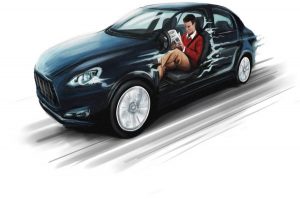By
The dawn of the ‘roboconomy’ is almost upon us, as car manufacturers increasingly turn their collective focus to self-driving, connected and electric cars, according to new research from PricewaterhouseCoopers’ global consulting arm Strategy&.
With the research anticipating that the first “robot cars” will take to the roads in various regions from 2023, how we travel could be in for a shake up in the near future.
Releasing its Digital Auto Report 2017, Strategy& notes “the future belongs to ‘shared mobility’”. The roboconomy, based on connected and self-driving cars, will comprise mobility offerings and associated car-related digital services.
While 85% of all new cars are already classed as connected, Richard Viereckl, Strategy& managing director and co-author of the study, said “electric and self-driving vehicles are only a few years away from definitive breakthrough”.
“It is particularly in the area of opportunity combining ‘connected’ and ‘self-driving’ that a huge new business segment is set to evolve in the years ahead for the entire automotive sector, in the form of digital mobility services,” Viereckl commented.
Meanwhile, the transition to “mobility-as-a-service” in the medium term is set to have an impact on both the automotive sector and customer behaviour, as pressure increases on margins in the conventional car production segment.
By 2030, Strategy& anticipates that 36% of all mileage driven in Europe will be in shared-use vehicles and 42% in self-driving vehicles.

Between 2017 and 2030, Strategy& forecasts that the market volume in shared mobility will rise annually by 24% in Europe, the US and China to €1.3 billion ($1.9 billion). Additionally, it predicts around 33% of all new vehicles will be used for shared mobility by 2030.
“The transition to shared or self-driving fleets means a massive upheaval for the automotive sector,” said Alex Koster, Strategy& managing director and study co-author.
“In future, vehicles will be used far more intensively than is the case for private cars today.
“Given the rapid depreciation, business segments such as the used-car trade will become less relevant, and the manufacturers will also be increasingly engaged in regular servicing work on fleet vehicles.”
Koster noted that competition will shift moving forward with fleet management, regionally different transport regulations and infrastructure seeing mobility become a local business.
The robot cars are coming: Welcome to the roboconomy
